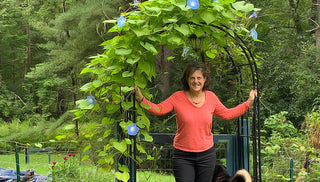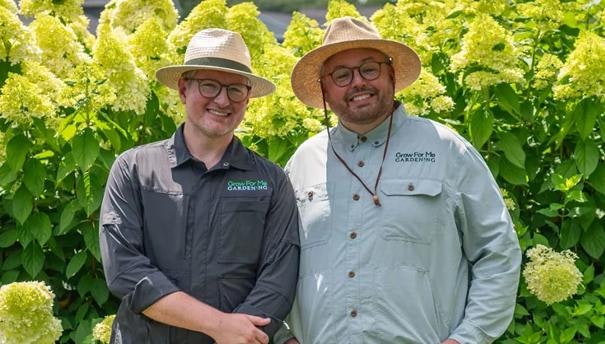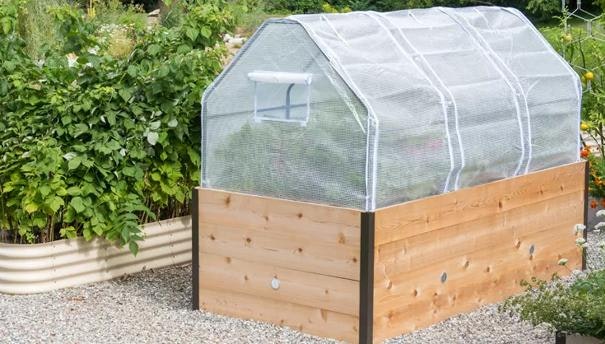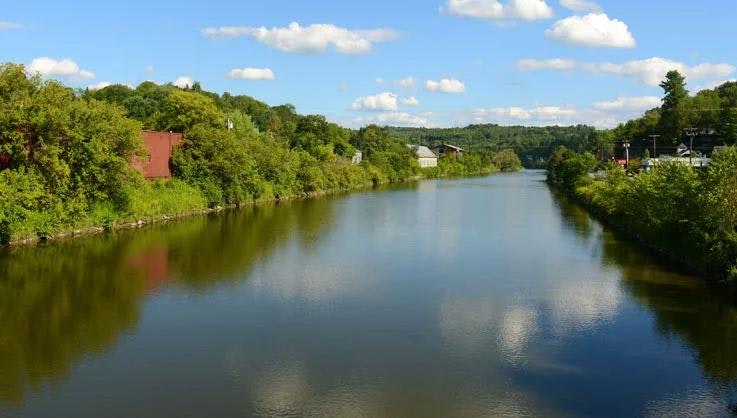Suzanne DeJohn loves everything about the natural world: the science that sprouts a seed, the mathematics behind a spiraling pinecone, the bold color of a blossoming flower, and the wonder of how plants seem to know what to do, without being told.
At home in Williston, Vermont, Suzanne delights in observing her gardens, from the mundane to the miraculous. “I love how all the parts of nature work together in such intricate ways,” Suzanne says. “We humans think we’re pretty smart, but I’m always amazed at how little we really know. It’s all such a beautiful mystery.”
 Arbors add drama and height to Suzanne's Vermont garden in every season, whether covered in summer vines like this clematis, or dusted with winter snow.
Arbors add drama and height to Suzanne's Vermont garden in every season, whether covered in summer vines like this clematis, or dusted with winter snow.In her job as a garden writer and educator, Suzanne translates complex scientific concepts from botany and horticulture into language that gardeners of all experience levels can understand and enjoy. She’s created educational materials and articles for many gardening organizations, including Gardener’s Supply and the nonprofits National Gardening Association and KidsGardening. She’s even contributed to the well-known Dummies book series: Organic Gardening for Dummies, Herb Gardening for Dummies, and Container Gardening for Dummies.
“By some grace or mercy in the universe, for the last 24 years I’ve gotten to work for garden-related organizations,” Suzanne says. “Much of the time I spent writing about something I love – plants and gardening.”
When did you get interested in gardening, and how did you learn?
My dad was a first-generation Italian and always had a vegetable garden, even though we lived in suburban Connecticut. My mom loved nature and created a woodland sanctuary on our lot. I helped out some, but looking back I wish I had spent more time with my parents in their gardens.
My undergraduate geology degree gave me a good foundation in the sciences, especially chemistry. It also piqued my curiosity about the natural world. I fell in love with plants and took courses in botany, plant pathology, and soil fertility. I thought about grad school, but ended up taking a more meandering path in life.
When I moved to Vermont in 1988, I learned from my housemates and by “trial and — ” … I don’t like to call it “error.” I think of it as “experimenting.” I’ve had gardens pretty much every year since I moved here.
What about gardening brings you the most joy or satisfaction?
It’s the miracle of it all. Planting seeds and seeing them sprout and grow is such a thrill. Taking a hard, seemingly lifeless nugget and then getting the brightest yellow sunflowers or brilliant red tomatoes. Where did that color come from?
I love observing nature, especially up close. I’m awed by the spiral buds of a morning glory, the peeling bark of a birch, the way a cucumber tendril stretches out until it touches something to coil around. How amazing, that a plant tendril can perceive when it has touched something, and then knows how to wrap around it! What else can plants do that we know nothing about?
How did you become a garden writer and educator?
Many years ago, I had a really boring job as an interior landscaper, watering plants in big buildings and hotels in Boston. Then I visited a friend in Bethel, decided Vermont was where I wanted to be, moved here, and got a job on a dairy farm. (The cows could smell my city-girl fear!) Later, I was at a craft show and I happened to meet one of the educators from the National Gardening Association. Next thing I knew, I was up at 5 a.m., answering gardening questions online for the organization. I wrote regional articles and even a botany course. I worked on all sorts of writing and book projects during the 14 years I was there, and I learned a lot.
What do you consider your areas of gardening expertise?
I love the science of gardening. My forté is explaining the principles of science in laypeople’s terms. I wrote a 200-page, online “botany for gardeners” course when I worked for the NGA, and it’s probably the writing I’m most proud of. It explains the principles of botany in a way that’s understandable and relevant for gardeners, and explains the “whys” behind many garden tasks. The NGA still uses it on their Learning Garden website, and they even modified it to create a new course for K-to-8 educators.
 Suzanne's edible landscape yields a bountiful—and colorful—vegetable harvest.
Suzanne's edible landscape yields a bountiful—and colorful—vegetable harvest.What kinds of gardening do you enjoy?
I grow some vegetables, flowers, and herbs. I grow lots of flowers for cutting because I love to share bouquets. They always include a stem or two of whatever herbs I have growing — especially Thai basil or rosemary—as my “signature.” I grow some houseplants, but not too many, because I don’t have much space or natural light.
Describe your own garden.
It’s a work in progress since I’ve only lived here two years. There’s about an acre of open land and an acre of woods, with shade in the front yard. I’ve got in-ground and raised beds, some fencing, and lots of weeds. I also grow a few flowers and herbs in planters near my entryway because I love how they look, but they require more frequent fertilizing and watering. (I’m not as diligent about watering as I could be.)
I’m trying to expand a bit while still keeping it manageable. Right now I’m finding it fun to play with hugelkultur—I piled up wood, compost, and other organic matter, and planted some blueberries on top to settle in. It’s my own little food forest, an ancient concept that takes the idea of edible landscaping a step further by planting layers of food-bearing plants to mimic a natural forest environment.
 Suzanne grows flowers to cut and arrange into bouquets, which she likes to share with friends.
Suzanne grows flowers to cut and arrange into bouquets, which she likes to share with friends.If you could only grow one plant, what would it be and why?
That’s impossible to answer! I’m a little bit in love with all my plants, especially the ones friends have given me over the years. But one of my favorites is basil. I love pesto and I make loads of it to freeze and use during the winter. I’m frugal, and it’s just too expensive to buy it pre-made.
How do you approach gardening challenges?
I’m a really laid-back gardener who likes to poke around and look at stuff. If I see a disease or insect, I get a kick out of trying to identify it. I don’t like slugs or tomato hornworms, but I understand their importance in the ecosystem. I saw my first parasitized tomato hornworm this summer, and it was cool … in a disturbing way. The parasites—larvae of tiny, non-stinging wasps—eat the hornworm from the inside out.
What is one of your most memorable gardening successes?
Once I took a cutting from an old apple tree, with tasty, blemish-free fruit, that I found way out in the woods. I grafted it onto a tree in the backyard of the place I was renting. It appeared to “take” but I ended up moving. I like to think that I’ve left every place I’ve lived a little more beautiful, with healthier soil.
What are some of your gardening best practices?
I love organic matter. Just pile stuff up and it decomposes into rich, dark compost — an amazing transformation. I leave piles around, intending to tidy up, and then the snow falls. Oops.
Those piles of old bark mulch, or weeds, or leaves, take it upon themselves (with the help of microbes, earthworms and, yes, slugs) to turn into compost. Pieces of sod? Pile ’em up. Or better yet, just cover the grass where you want a new bed. I’ll rake a mountain of leaves over an area, toss some soil on top to hold them in place, and by the following summer they’ve broken down, the sod underneath is dead and decaying, and it’s ready to plant.
How has your gardening style changed through the years?
I grow more flowers. After a long, gray winter, I have a physical hunger for color, and flowers fill it perfectly.
I also take more time to appreciate things close up. I love the intricate markings on the tiniest flower, or how spring leaves deepen in color as they unfurl. I love the spirals on pinecones. There’s a series of amazing videos by mathemusician Vi Hart about plant spirals and how they reflect a mathematical number series known as the Fibonacci sequence. I’ve watched them many times.
What trends do you see in gardening these days?
I don’t really follow trends, but I do love that people seem to be taking more interest in nature and ecosystems, including how huge a role various types of fungi play in our world. Once you start to see how much we depend on these interactions, it’s much tougher to spray a fungicide or insecticide. I hope our current obsession with disinfectant doesn’t undo our new appreciation for all the microbial world does for us.
What do you feel are the biggest benefits of gardening?
My deepest goals in life are to be kind and to have a heart that is at ease. I love that phrase, “at ease.” It’s not necessarily happy, but quiet and at peace. Gardening helps put my heart at ease. When my heart is at ease, I can be kinder, more loving, and more patient with myself and others. It’s a work in progress, of course.
I’m pretty tuned into plants — more so than people, I suppose. But I don’t consider gardening a competitive sport. If something brings me joy and peace, that’s enough for me, even if to someone else it looks like a weedy mess.
Have any of your friends or family been bitten by the gardening bug?
Many of my friends have been gardeners for as long as I’ve known them. I met a 20-something friend, many years ago, who wanted to learn some homesteading skills. One day she called and asked, “Do you know how to make a pumpkin pie from a pumpkin?” Clearly she had only seen one made with canned pumpkin, if that! So we had a fun day baking together. She’s now an avid gardener and lover of nature.
Do you have any advice for new gardeners?
Stop. Look closely. Appreciate. Don’t worry about what others think or say. There will always be some tasks you find onerous, but for the most part gardening should be an enjoyable way to spend time.
My philosophy is, “If I’m not enjoying myself, then it’s work and I should be paid for it.” That’s when I stop gardening, grab a glass of wine, and sit. Gardening should feed the soul. If it doesn’t, it might not be the right hobby, or you may be approaching it with a success-failure attitude. Try gardening with an “it’s an enjoyable hobby” attitude and see if that helps.
What are some of your favorite gardening tools?
I don’t like to wear gloves, but I hate touching slugs even more. So sometimes I’ll wear one of Gardener’s Nitrile Gloves on my slug-picking hand.
I think arches and obelisks look beautiful covered in morning glories and thunbergia vines in summer, or with a dusting of snow in winter. I have a bunch of different ones.
How did you begin your relationship with Gardener’s Supply?
I had long been a customer when they hired me to be their copywriter, which I did for about eight years. I also managed their website content for two more. I appreciate Gardener’s Supply’s mission to improve the world through gardening, and I had many wonderful colleagues there.
Now I work for the nonprofit, KidsGardening. Gardener’s Supply generously provides space for our small staff at their administrative offices in Burlington, Vermont.
Is there anything else you’d like to tell Gardener’s Supply readers?
Every gardener, no matter how experienced, has dealt with plants that won’t thrive. Killing a plant doesn’t make you a bad gardener. Celebrate the beauty, and when a plant dies, put it in your compost pile and let the nutrients it contains feed other plants.
You can read some of the educational articles that Suzanne DeJohn has written for Gardener’s right here on our website. Check out All About Yellow Jackets, Bees, Wasps & Hornets, Saving Seeds: One of Gardening's Best-Kept Secrets, and How Genetic Engineering Differs from Traditional Plant Breeding.





